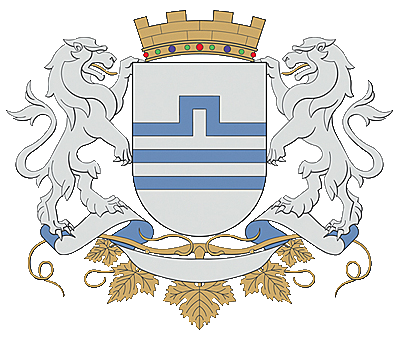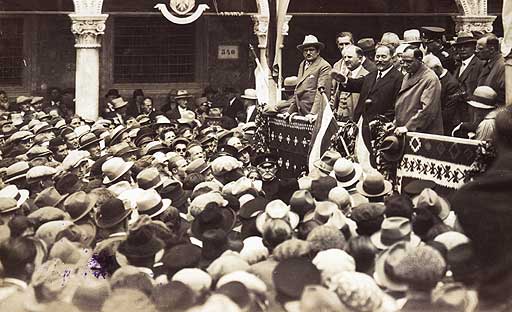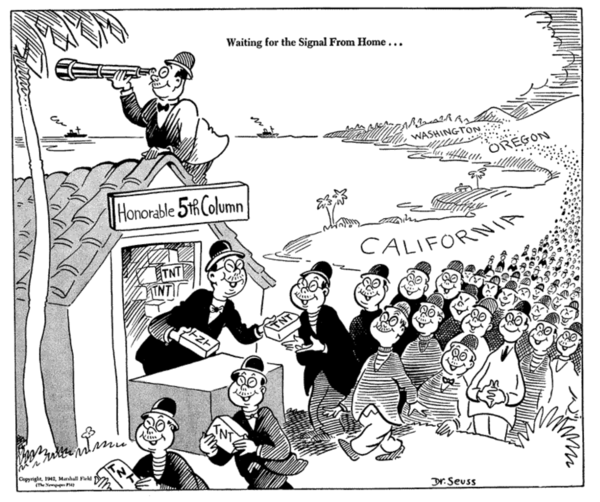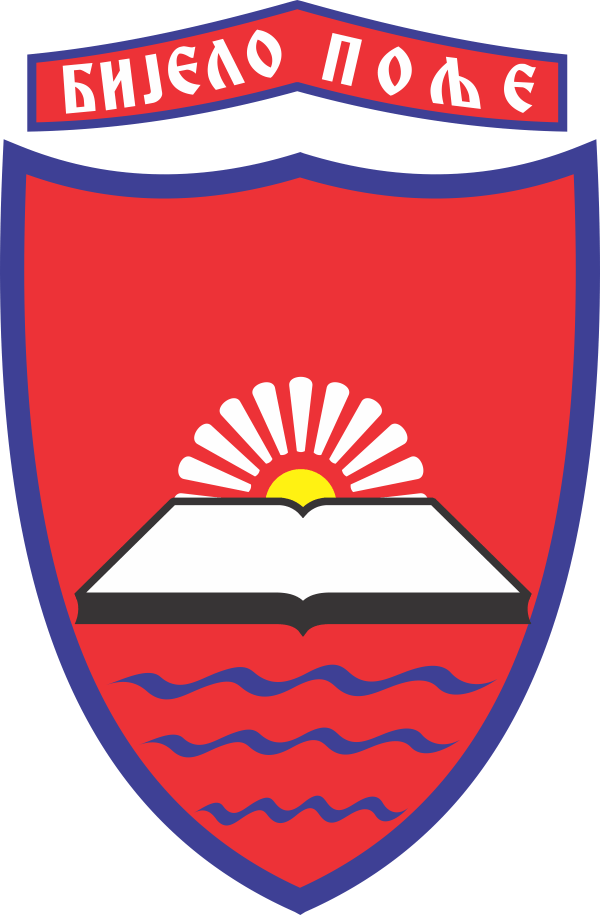|
Velimir Terzić
Velimir Terzić ( sr, Велимир Терзић; 26 May 1908 – 13 December 1983) was a Yugoslav People's Army captain, partisan general, and historian. Military career Terzić was born on 26 May 1908 in Golubovci, near Podgorica, Montenegro. Prior to World War II, he was captain of the Royal Yugoslav Army. After Yugoslavia's defeat in the April War, he joined the Montenegrin partisans and took part in the 13 July Uprising. He commanded the Bijelo Polje unit. By the summer of 1942, he became the deputy of general Arso Jovanović, chief of partisan Supreme HQ. Terzić also commanded the main staff of Montenegro, was deputy commander of the 5th Montenegrin Proletarian brigade, chief of staff of the fifth operative zone and the main staff of Croatia. In April 1944, along with Milovan Djilas, he headed a Yugoslav military mission to the Soviet Union. After the war, he remained in the Yugoslav People's Army and had many roles, including chief inspector and head of the Military ... [...More Info...] [...Related Items...] OR: [Wikipedia] [Google] [Baidu] |
Golubovci
Golubovci ( cnr, Голубовци, ) is a small town in the Podgorica Municipality of Montenegro. It has 3,110 residents according to 2011 census, while the ''Golubovci City Municipality'' accounts for some 16,093 residents. Transport Sometimes Podgorica Airport is referred as to Golubovci Airport by locals, the airport being just 5 km away from the town. Golubovci is located next to the M-2, Podgorica - Bar road ( E65/ E80), main Montenegrin road connection between the coast and northern part of the country. Part of this road went through the centre of Golubovci causing frequent traffic jams during the summer tourist season which led to construction of 4-lane dual carriageway, the Golubovci Bypass, in 2018. Sports The town is home to FK Zeta, one of the most successful Montenegrin football clubs in recent years. They play their home games at the Stadion Trešnjica. The town's basketball team is KK Zeta 2011. Ethnic composition Town (2011) *Montenegrins - 1,920 (61.7 ... [...More Info...] [...Related Items...] OR: [Wikipedia] [Google] [Baidu] |
World War II
World War II or the Second World War, often abbreviated as WWII or WW2, was a world war that lasted from 1939 to 1945. It involved the vast majority of the world's countries—including all of the great powers—forming two opposing military alliances: the Allies and the Axis powers. World War II was a total war that directly involved more than 100 million personnel from more than 30 countries. The major participants in the war threw their entire economic, industrial, and scientific capabilities behind the war effort, blurring the distinction between civilian and military resources. Aircraft played a major role in the conflict, enabling the strategic bombing of population centres and deploying the only two nuclear weapons ever used in war. World War II was by far the deadliest conflict in human history; it resulted in 70 to 85 million fatalities, mostly among civilians. Tens of millions died due to genocides (including the Holocaust), starvation, ma ... [...More Info...] [...Related Items...] OR: [Wikipedia] [Google] [Baidu] |
Ustaše
The Ustaše (), also known by anglicised versions Ustasha or Ustashe, was a Croats, Croatian Fascism, fascist and ultranationalism, ultranationalist organization active, as one organization, between 1929 and 1945, formally known as the Ustaša – Croatian Revolutionary Movement ( hr, Ustaša – Hrvatski revolucionarni pokret). Its members murdered hundreds of thousands of Serbs of Croatia, Serbs, Jews of Croatia, Jews, and Romani people in Croatia, Roma as well as political dissidents in World War II in Yugoslavia, Yugoslavia during World War II. The ideology of the movement was a blend of fascism, Roman Catholicism and Croatian nationalism, Croatian ultranationalism. The Ustaše supported the creation of a Greater Croatia that would span the Drina River and extend to the border of Belgrade. The movement emphasized the need for a Racial purity, racially "pure" Croatia and promoted Genocide of Serbs in the Independent State of Croatia, genocide against Serbs—due to the Usta ... [...More Info...] [...Related Items...] OR: [Wikipedia] [Google] [Baidu] |
Vladko Maček
Vladimir Maček (20 June 1879 – 15 May 1964) was a politician in the Kingdom of Yugoslavia. As a leader of the Croatian Peasant Party (HSS) following the 1928 assassination of Stjepan Radić, Maček had been a leading Croatian political figure until the Axis invasion of Yugoslavia in 1941. As a leader of the HSS, Maček played a key role in establishment of the Banovina of Croatia, an autonomous banovina in Yugoslavia in 1939. Early life Maček was born in Kupinec near Jastrebarsko, southwest of Zagreb. His father Ivan was a Slovene, originally from Lesično, and his mother Ida was of mixed Croatian, on her father's side, and Polish descent on her mother's. At the age of six, Maček started attending elementary school in Kupinec, but continued his education in Zagreb, as his father, a public employee, was transferred there. In Zagreb, Maček enrolled at a gymnasium, which he finished when he was 18 and enrolled at the Faculty of Law, University of Zagreb. He earned ... [...More Info...] [...Related Items...] OR: [Wikipedia] [Google] [Baidu] |
Croatian Peasant Party
The Croatian Peasant Party ( hr, Hrvatska seljačka stranka, HSS) is an agrarian political party in Croatia founded on 22 December 1904 by Antun and Stjepan Radić as Croatian Peoples' Peasant Party (HPSS). The Brothers Radić believed that the realization of Croatian statehood was possible within Austria-Hungary, but that it had to be reformed as a Monarchy divided into three equal parts – Austria, Hungary, Croatia. After the creation of Kingdom of Yugoslavia in 1918, Party requested for the Croatian part of the Kingdom to be based on self-determination. This brought them great public support which culminated in 1920 parliamentary election when HPSS won all 58 seats assigned to Croatia. In 1920, disgruntled with a bad position of Croats in the Kingdom, the party changed its name into Croatian Republican Peasant Party (HRSS) and started advocating secession from the Kingdom and the establishment of ''"peaceful peasant Republic of Croatia"''. On 1923 and 1925 election, HRS ... [...More Info...] [...Related Items...] OR: [Wikipedia] [Google] [Baidu] |
Fifth Column
A fifth column is any group of people who undermine a larger group or nation from within, usually in favor of an enemy group or another nation. According to Harris Mylonas and Scott Radnitz, "fifth columns" are “domestic actors who work to undermine the national interest, in cooperation with external rivals of the state." The activities of a fifth column can be overt or clandestine. Forces gathered in secret can mobilize openly to assist an external attack. This term is also extended to organised actions by military personnel. Clandestine fifth column activities can involve acts of sabotage, disinformation, espionage, and/or terrorism executed within defense lines by secret sympathizers with an external force. Origin The term "fifth column" originated in Spain (originally ''quinta columna'') during the early phase of the Spanish Civil War. It gained popularity in the Loyalist faction media in early October 1936 and immediately started to spread abroad. The exact origins of t ... [...More Info...] [...Related Items...] OR: [Wikipedia] [Google] [Baidu] |
Croatia
, image_flag = Flag of Croatia.svg , image_coat = Coat of arms of Croatia.svg , anthem = "Lijepa naša domovino"("Our Beautiful Homeland") , image_map = , map_caption = , capital = Zagreb , coordinates = , largest_city = capital , official_languages = Croatian , languages_type = Writing system , languages = Latin , ethnic_groups = , ethnic_groups_year = 2021 , religion = , religion_year = 2021 , demonym = , government_type = Unitary parliamentary republic , leader_title1 = President , leader_name1 = Zoran Milanović , leader_title2 = Prime Minister , leader_name2 = Andrej Plenković , leader_title3 = Speaker of Parliament , leader_name3 = Gordan Jandroković , legislature = Sabor , sovereignty_type ... [...More Info...] [...Related Items...] OR: [Wikipedia] [Google] [Baidu] |
Military History Institute
A military, also known collectively as armed forces, is a heavily armed, highly organized force primarily intended for warfare. It is typically authorized and maintained by a sovereign state, with its members identifiable by their distinct military uniform. It may consist of one or more military branches such as an army, navy, air force, space force, marines, or coast guard. The main task of the military is usually defined as defence of the state and its interests against external armed threats. In broad usage, the terms ''armed forces'' and ''military'' are often treated as synonymous, although in technical usage a distinction is sometimes made in which a country's armed forces may include both its military and other paramilitary forces. There are various forms of irregular military forces, not belonging to a recognized state; though they share many attributes with regular military forces, they are less often referred to as simply ''military''. A nation's military may ... [...More Info...] [...Related Items...] OR: [Wikipedia] [Google] [Baidu] |
Soviet Union
The Soviet Union,. officially the Union of Soviet Socialist Republics. (USSR),. was a transcontinental country that spanned much of Eurasia from 1922 to 1991. A flagship communist state, it was nominally a federal union of fifteen national republics; in practice, both its government and its economy were highly centralized until its final years. It was a one-party state governed by the Communist Party of the Soviet Union, with the city of Moscow serving as its capital as well as that of its largest and most populous republic: the Russian SFSR. Other major cities included Leningrad (Russian SFSR), Kiev (Ukrainian SSR), Minsk ( Byelorussian SSR), Tashkent (Uzbek SSR), Alma-Ata (Kazakh SSR), and Novosibirsk (Russian SFSR). It was the largest country in the world, covering over and spanning eleven time zones. The country's roots lay in the October Revolution of 1917, when the Bolsheviks, under the leadership of Vladimir Lenin, overthrew the Russian Provisional Government ... [...More Info...] [...Related Items...] OR: [Wikipedia] [Google] [Baidu] |
Milovan Djilas
Milovan Djilas (; , ; 12 June 1911 – 30 April 1995) was a Yugoslav communist politician, theorist and author. He was a key figure in the Partisan movement during World War II, as well as in the post-war government. A self-identified democratic socialist, Djilas became one of the best-known and most prominent dissidents in Yugoslavia and all of Eastern Europe. During an era of several decades, he critiqued communism from the viewpoint of trying to improve it from within; after the revolutions of 1989 and the violent breakup of Yugoslavia, he critiqued it from an anti-communist viewpoint of someone whose youthful dreams had been disillusioned. Early life and revolutionary activities Milovan Djilas was born in Podbišće near Mojkovac, Kingdom of Montenegro, on 12 June 1911 into a Montenegrin Serb peasant family. He was the fourth of nine children. His father Nikola, a recipient of the Obilić Medal for bravery, served in the Montenegrin Army during the Balkan Wars of 1912� ... [...More Info...] [...Related Items...] OR: [Wikipedia] [Google] [Baidu] |
Arso Jovanović
Arsenije "Arso" Jovanović ( sr-cyr, Арсо Јовановић; 24 March 1907 – 12 August 1948) was a Yugoslav partisan general and one of the country's foremost military commanders during World War II in Yugoslavia. Educated through the Yugoslav Royal Army academies, Jovanović was one of the best-educated generals among the partisan forces in Yugoslavia, speaking French, Russian and English. His military reports distinguished him, sometimes running to as many as ten pages, and he stayed close to the partisan High Command, lecturing in the first partisan officer school in Drvar, 1944. After the Tito–Stalin Split in 1948, Jovanović openly sided with the Soviet Union. He was killed by Yugoslav border guards while trying to escape to Romania with two other Montenegrin dissidents, Vlado Dapčević and Branko Petričević, who were captured alive. Biography Arso Jovanović was born in the village of Zavala near Podgorica, Principality of Montenegro on March 24, 1907, into a ... [...More Info...] [...Related Items...] OR: [Wikipedia] [Google] [Baidu] |
Bijelo Polje
Bijelo Polje ( cnr, Бијело Поље, ) is a town in northeastern Montenegro on the Lim (river), Lim River. It has an urban population of 15,400 (2011 census). It is the administrative, economic, cultural and educational centre of northern Montenegro. Bijelo Polje is the center of Bijelo Polje Municipality (population of 46,051). It is the unofficial center of the north-eastern region of Montenegro. Bijelo Polje means 'white field' in Serbo-Croatian language, Serbo-Croatian. History Bijelo Polje's Saint Peter and Paul Church is the place where the UNESCO Miroslav's Gospel of Miroslav of Hum, Miroslav, brother of Serbian ruler Stefan Nemanja was written. During World War II, Bijelo Pole was a prominent location for the anti-fascist resistance movement in Yugoslavia, Montenegro in particular. Population Bijelo Polje is the administrative centre of the Bijelo Polje municipality, which in 2011 had a population of 46,251. The town of Bijelo Polje itself has 15,400 citizens. P ... [...More Info...] [...Related Items...] OR: [Wikipedia] [Google] [Baidu] |






